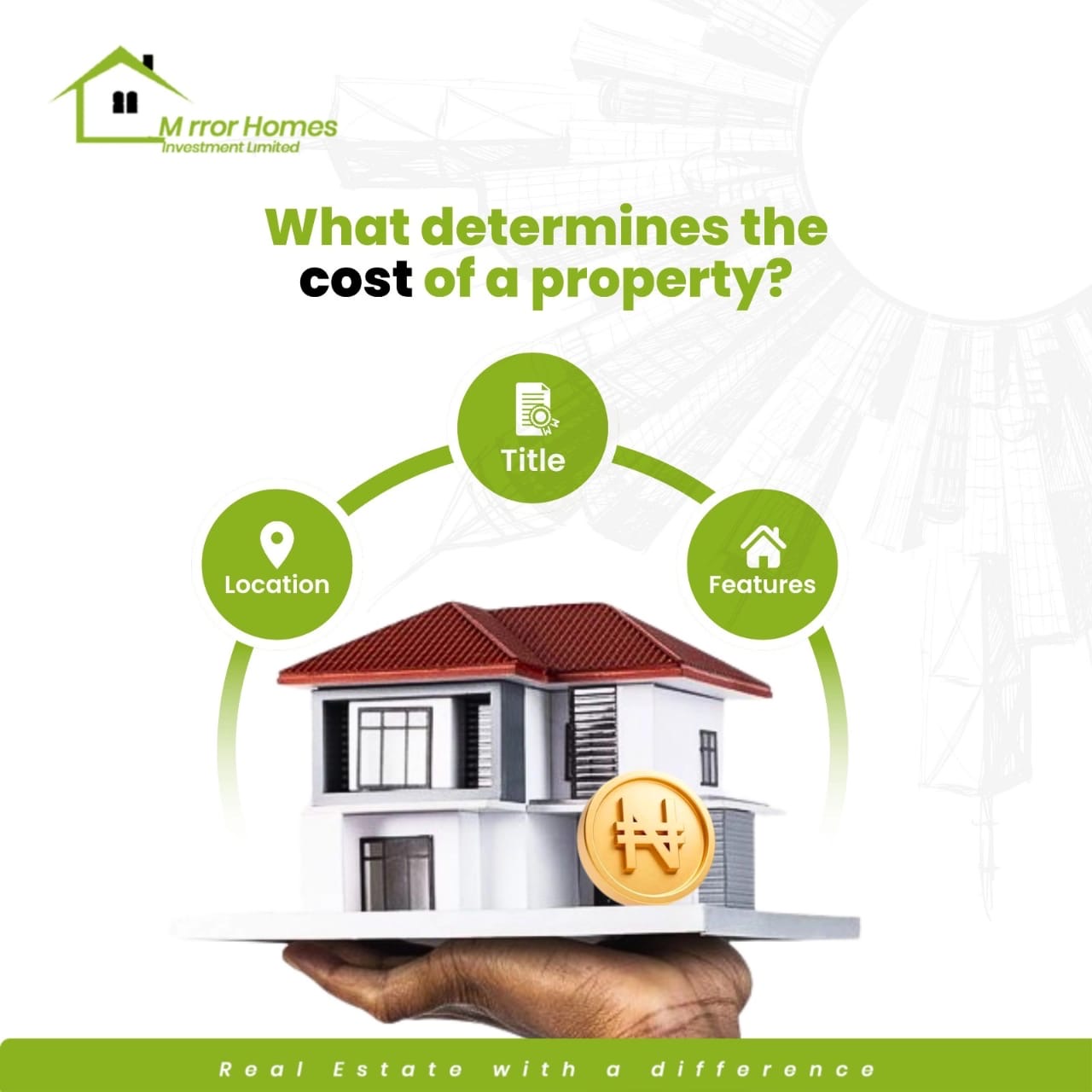When it comes to purchasing real estate, understanding what drives property prices is crucial for making informed decisions. Several factors influence the cost of a property, each contributing to its overall value. In this blog, we will explore five major determinants: Location, Title, Excision and Gazette, Governor’s Consent, and Features. These elements not only affect the price but also the long-term investment potential of a property.
Location: The Heart of Property Valuation
Location is arguably the most significant factor in determining a property’s value. The phrase “location, location, location” is a staple in real estate for a reason. Here’s why:
- Proximity to Amenities: Properties situated near essential services such as schools, hospitals, shopping centers, and public transportation tend to be more expensive. The convenience of having these amenities close by makes the property more desirable and valuable.
- Neighborhood Quality: The overall quality of the neighborhood, including safety, cleanliness, and community reputation, has a direct impact on property prices. A well-maintained, secure neighborhood with a good reputation can significantly increase a property’s value.
- Economic Development: Areas experiencing economic growth or infrastructure development, such as new highways, business districts, or airports, often see a rise in property values. These developments promise future growth, making properties in such locations attractive investments.
- Natural Surroundings: Properties with scenic views, such as those overlooking the ocean, mountains, or parks, are usually more valuable. The aesthetic and recreational benefits of natural surroundings add to the property’s appeal and price.
Title: Security and Assurance
The legal status of a property, known as the title, is another critical factor influencing its cost. A clear and secure title ensures that the property is free from legal disputes and ownership issues.
- Freehold vs. Leasehold: Freehold properties, where the owner has indefinite ownership of the land and buildings, are generally more valuable than leasehold properties, which are owned for a fixed period under a lease agreement.
- Registered Title: Properties with a registered title offer greater security to buyers. The assurance that the property is legally recognized and free from disputes adds to its value.
- Title Insurance: Having title insurance can also enhance a property’s value. It protects against any legal issues that may arise regarding property ownership, providing buyers with peace of mind.
Excision and Gazette: Recognizing Government-Approved Land
Excision and Gazette are crucial documents that indicate government recognition and approval of land for development.
- Excision: Excision is the process by which the government releases a portion of land to indigenous people or communities, which then becomes free from government acquisition. Land that has been excised is more valuable because it is legally recognized for private ownership and development.
- Gazette: A Gazette is an official record that shows the government’s recognition of a piece of land as free from acquisition. Properties listed in a Gazette are recognized by the government as safe and free for development. This recognition increases the property’s value and reduces the risk of future disputes.
- Enhanced Security: Knowing that a property is excised and gazetted provides buyers with additional security and assurance, making such properties more desirable and valuable.
Governor’s Consent: Legal Approval for Transfers
Governor’s Consent is a crucial legal requirement for the transfer of land ownership in Nigeria. It is necessary to validate the transaction and ensure it is legally binding.
- Proof of Legal Transfer: Obtaining the Governor’s Consent confirms that the land transaction is legal and recognized by the state government. This adds to the property’s value as it assures potential buyers of the legality and security of their investment.
- Enhanced Marketability: Properties with Governor’s Consent are easier to sell and often attract higher prices because they come with the assurance of a legally binding title transfer.
Features: Enhancing Value and Livability
The specific features and amenities of a property can significantly influence its market value. These include both the tangible aspects of the property and the quality of its construction and maintenance.
- Size and Layout: The size of the property, including the land and built-up area, is a primary factor in its valuation. Larger properties with well-designed layouts and efficient use of space typically attract higher prices.
- Quality of Construction: High-quality construction using durable materials and finishes adds to a property’s value. Buyers are willing to pay more for properties that promise longevity and minimal maintenance.
- Modern Amenities: Properties equipped with modern amenities such as swimming pools, gyms, high-speed internet, and smart home features can command higher prices. These amenities enhance the living experience and are highly sought after.
- Green Features: Properties with eco-friendly features like energy-efficient appliances, solar panels, and sustainable building materials are increasingly valuable. They offer long-term cost savings and appeal to environmentally conscious buyers.
- Curb Appeal: The exterior appearance of a property, including landscaping, facade design, and overall aesthetic, can significantly impact its value. A property with excellent curb appeal creates a strong first impression and attracts more buyers.
Conclusion
Understanding the factors that determine the cost of a property is essential for anyone looking to invest in real estate. Location, title, Excision and Gazette status, Governor’s Consent, and features are the primary determinants that influence property value. By carefully considering these aspects, you can ensure that you are making a sound investment, whether you are buying for personal use or as part of a broader real estate portfolio.
Investing in real estate is a significant financial decision. Having a clear understanding of these determinants will help you navigate the market with confidence and make informed choices. Always conduct thorough research and consult with real estate professionals to ensure that your investment is wise and secure.



